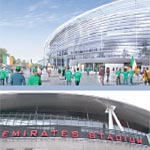Let stadia buyers beware |
 |
| Johnny O'Shea explains why caveat emptor really applies to sports venue naming rights |
Brace yourselves. The practice of sports venue naming rights
is set to become a regular outlet for brand owners to communicate with Irish
audiences. The redevelopment of Lansdowne
Road is set to attract the attention of some of Ireland's
leading brands. But are naming rights deals with sporting venues a wise
investment?
Recently, the Munster branch
of the IRFU voted against selling the naming rights to Thomond Park,
a decision welcomed by the rugby fraternity in the south west and beyond. The
emotional connection between Munster
fans and their revered home was bound to prove a major stumbling block for a
prospective sponsor at this juncture.
In more testing financial climates, the likelihood is that
the IRFU, which has the final say on any commercial deals for Thomond Park,
will decide to cash in on the naming rights. These rights are seen as a
saleable asset. A time will come when a deal will be inevitable.
The sporting landscape in Ireland remains cluttered with the
big four sports – GAA games, soccer, rugby and golf – accounting for over 60
per cent of the annual sports sponsorship spend. Rugby's
recent broad appeal (despite our performances in the World Cup and Six Nations)
has seen a huge increase in the demand for high end properties.
The principal rights holder, the IRFU, has in excess of 20
corporate sponsors all eager to use the elevated platform that rugby has
created since the inception of the professional era to communicate their brand
messages to an increasingly marketing-savvy nation.
With few opportunities at the top end of the domestic
sponsorship environment, brands will view venue naming rights as a natural
progression of the practice of sponsorship. Looking to the US, it is not hard to see why both
rights holders and brand owners are using venue and stadia naming rights as a
central part of their sponsorship models.
For rights holders it has presented a lucrative and
long-term revenue stream, while brands recognize the positive image that can be
portrayed by partnering with the, often multi-purpose home of a successful
sports franchise. Statistics in the US prove the point.
In the National Hockey League (NHL), 87 per cent of teams
play in named facilities. The figures for the NBA and NFL are 77 per cent and
56 per cent respectively. Naming rights in the US has largely proved successful
for both the rights holder and the brands.
Can this formula be replicated in Ireland? The US success lies mainly in the sale
of naming rights to newly built facilities. The same applies to the UK
with Arsenal's Emirates stadium and Bolton Wanderers' Reebok Stadium both built
in recent years.
In acquiring the naming rights to a new facility, the
sponsor is essentially creating a new brand with which to communicate with the
desired target audience. This is not so with venues like Thomond Park
or Lansdowne Road.
The history and tradition associated with these stadia makes the process of
establishing a new name more difficult.
 |
GROUND FOR CONCERNThe IRFU will have a harder job than Arsenal Football Club did in convincing the Emirates airline to sponsor its new 60,000-seat stadium in north London. That is because the new stadium at Lansdowne Road is being built on the site of the oldest rugby ground, where sentiment and tradition compete with commercial realities. |
Lansdowne Road
is the world's oldest international rugby ground and has over 130 years of
tradition and memories of both international rugby and soccer behind it. Thomond Park
is revered in Limerick and beyond for the epic battles that Munster have been involved with, not least
their famous 12-0 victory over the All Blacks in 1978.
The sporting media and the sporting public, two of the most
crucial audiences for a sports venue naming rights sponsor, will most likely
continue to reference the stadia as they have done in the past. Even allowing
for a substantial investment by the naming sponsor in a promotional campaign
surrounding the name change it is difficult to imagine the ‘Toyota Factor'
registering the same emotional connection that the ‘Thomond Factor' musters up.
The ‘Ladbrokes Roar' anyone? Don't think so.
On top of the fee that they have to spend for the venue
naming rights, the sponsor will have to invest heavily in an ongoing PR
campaign to win the hearts and minds of the stakeholders. It will need to
strike the appropriate balance between respect for the venue's history while,
at the same time, realising a commercial return for the brand. Erasing the name
Thomond Park or Lansdowne Road is not the approach that a
naming sponsor will want to take. That is the inherent danger with purchasing
the naming rights to a stadium with a proud and historic tradition.
Sponsorship remains the lifeblood of professional sport and
brands will continue to work with sporting rights holders in establishing
communications platforms that present the sponsor in a light that will enhance
the experience of the supporter.
Brands contemplating a commitment to venue naming rights in
this marketplace must prepare themselves for an initial embryonic phase where
both the media and sporting public will undoubtedly react with a degree of skepticism.
It is how the messages communicated by the sponsoring brands
are received by the public that will determine how successful, or popular, the
new medium becomes.
Johnny O'Shea (joshea@platinumone.ie) is a director of Platinum One.









